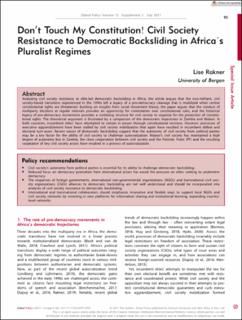| dc.contributor.author | Rakner, Lise | |
| dc.date.accessioned | 2022-03-03T14:00:34Z | |
| dc.date.available | 2022-03-03T14:00:34Z | |
| dc.date.created | 2021-08-02T09:33:29Z | |
| dc.date.issued | 2021 | |
| dc.identifier.issn | 1758-5880 | |
| dc.identifier.uri | https://hdl.handle.net/11250/2982868 | |
| dc.description.abstract | Analyzing civil society resistance to elite-led democratic backsliding in Africa, the article argues that the non-militant, civil society-based transitions experienced in the 1990s left a legacy of a pro-democracy cleavage that is mobilized when central constitutional rights are threatened. Building on insights from social movement theory, the paper argues that the conduct of multiparty elections at regular intervals provides an opportunity for contestation over constitutional rules, and the historical legacy of pro-democracy movements provides a mobilizing structure for civil society to organize for the protection of constitutional rights. The theoretical argument is illustrated by a comparison of the democratic trajectories in Zambia and Malawi. In both countries, incumbent elites’ have attempted to remain in power through constitutional revisions. However, processes of executive aggrandizement have been stalled by civil society mobilization that again have resulted in incumbent defeat and electoral turn-overs. Recent waves of democratic backsliding suggest that the autonomy of civil society from political parties may be a key factor for the ability of civil society to challenge autocratization. Malawi’s civil society has maintained a high degree of autonomy but in Zambia, the close cooperation between civil society and the Patriotic Front (PF) and the resulting cooptation of key civil society actors have resulted in a process of autocratization. | en_US |
| dc.language.iso | eng | en_US |
| dc.publisher | Wiley | en_US |
| dc.rights | Attribution-NonCommercial-NoDerivatives 4.0 Internasjonal | * |
| dc.rights.uri | http://creativecommons.org/licenses/by-nc-nd/4.0/deed.no | * |
| dc.title | Don’t Touch My Constitution! Civil Society Resistance to Democratic Backsliding in Africa's Pluralist Regimes | en_US |
| dc.type | Journal article | en_US |
| dc.type | Peer reviewed | en_US |
| dc.description.version | publishedVersion | en_US |
| dc.rights.holder | Copyright 2021 The Authors | en_US |
| cristin.ispublished | true | |
| cristin.fulltext | original | |
| cristin.qualitycode | 1 | |
| dc.identifier.doi | 10.1111/1758-5899.12991 | |
| dc.identifier.cristin | 1923299 | |
| dc.source.journal | Global Policy | en_US |
| dc.source.pagenumber | 95-105 | en_US |
| dc.relation.project | Norges forskningsråd: 262862 | en_US |
| dc.identifier.citation | Global Policy. 2021, 12 (S5), 95-105. | en_US |
| dc.source.volume | 12 | en_US |
| dc.source.issue | S5 | en_US |

